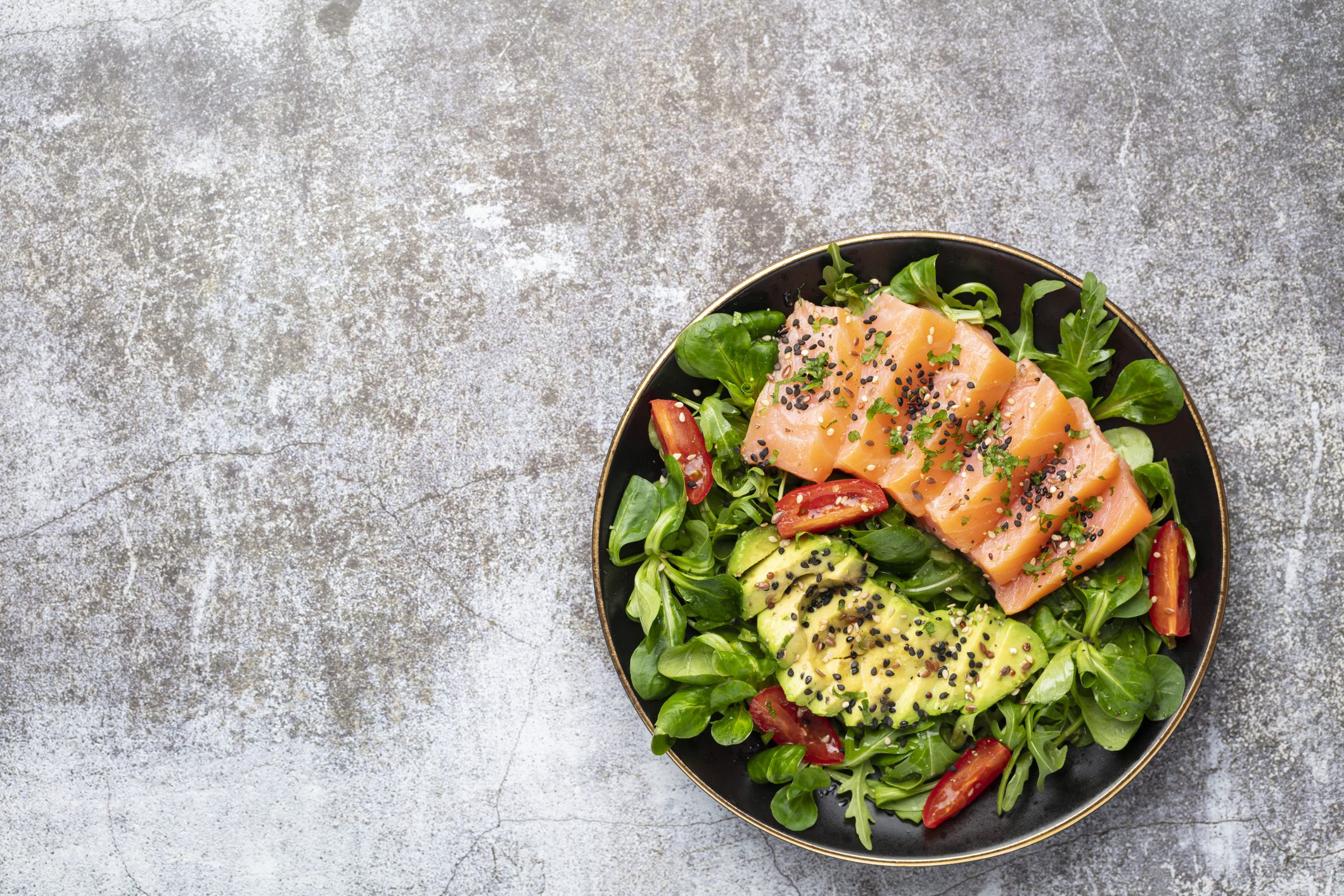Metabolism is the big buzzword these days when it comes to weight loss, but most people misunderstand the word. Metabolism simply refers to the process of converting food into energy to support breathing, digestion, physical activity, body temperature, and the zillion other tasks that your body performs regularly.
While you might think you want a fast metabolism, what you really want is a flexible metabolism. By flexible, I mean that your body efficiently utilizes both carbohydrates and fats as energy sources, depending on availability and your body’s demands. Flexibility allows for a seamless transition between using glucose (derived from carbohydrates) and fatty acids (derived from fats) for fuel.
When metabolic flexibility is impaired, the body becomes metabolically inflexible and relies heavily on one fuel source, usually carbohydrates. Insulin resistance, weight gain, and difficulty losing weight are some of the repercussions of metabolic inflexibility.1
The right foods support healthy insulin levels, lower inflammation, and help you burn fat like a pro. When you consistently choose these foods and eat protein first, you’re creating a powerful combo to get full faster, balance blood sugar, build muscle, and get the most out of every meal.
While any food in The Virgin Diet proves to be a metabolic champion, these 10 contenders upgrade metabolic flexibility to the next level.
1. Avocado
These berries (yes, berries!) are chock-full of nutrients, including vitamins K and E, potassium, and magnesium, as well as the vision-supporting antioxidants lutein and zeaxanthin. Those and other nutrients keep your metabolic machinery humming smoothly.
But avocados’ big claim to metabolic fame? They’re rich in heart-healthy monounsaturated fat, for one, which increases satiety, keeps your appetite in check, reduces inflammation, supports hormone balance, and improves insulin sensitivity.
Avocado is also a fiber heavyweight. When you get enough fiber, you regulate your appetite while giving your gut the love it deserves.2
Those are among the reasons that one study found adults who ate avocados regularly made smarter overall eating choices. These folks consumed higher amounts of nutrients, too.
Altogether, these choices reduced their risk of metabolic syndrome.3 Left unchecked, high blood pressure, high blood sugar, excess body fat, and other symptoms of metabolic syndrome pave the path for obesity, diabetes, and more.
Try this recipe: Creamy Roasted Avocado combines roasted garlic and the crunch of toasted pumpkin seeds with all the deliciousness of avocado.
2. Wild-Caught Salmon
Wild-caught salmon has two metabolism-boosting advantages. One, this popular fish is high in anti-inflammatory omega-3 fatty acids, helping you burn fat while preserving muscle mass.
One study found that supplementing with eicosapentaenoic acid (EPA) and docosahexaenoic acid (DHA)—the two primary omega-3s in fish—significantly increased resting metabolic rate by 14%, energy expenditure (how much energy your body uses) during exercise by 10%, and the rate of fat breakdown by 19% (and during exercise that number increased to 27%).4
Omega Plus provides therapeutic amounts of the omega-3 fatty acids EPA and DHA, along with vitamin E isomers as Delta Gold® in one easy-to-take softgel.*
Wild-caught salmon is also a protein superstar, with an impressive 24 grams of complete protein in a 4-oz cooked portion. This magic macronutrient has a higher thermic effect compared with carbs and fat. What’s more, protein improves satiety, helps build and support muscle, and provides so many other metabolic benefits.
Try this recipe: Detoxifying Asian-Style Salmon Stir-Fry is a flavorful, metabolic-boosting meal to satisfy the most finicky eater.
3. Coffee
If you’ve ever felt that extra rev after a pre-workout java fix, you know coffee’s energy-boosting power. Coffee has a thermogenic effect, meaning it can increase heat production, which increases your metabolic rate so you burn more calories.
For a while, researchers attributed coffee’s metabolism-boosting power to caffeine, which indeed can boost metabolic rate and enhance fat breakdown. But coffee is also an antioxidant powerhouse, including chlorogenic acids and polyphenols, which help protect cells from oxidative damage, reduce inflammation, and support overall metabolic health. 5
Synergistically, caffeine and other compounds in coffee can reduce feelings of hunger and increase feelings of fullness. Enjoying a pre-workout coffee can also improve physical performance and endurance, giving you more intense and longer-lasting workouts.
When it comes to coffee’s benefits, quality matters. Choose high-quality, organic coffee beans that are mycotoxin-free (I like Bulletproof Coffee). Douse it with sugar and cream and you’re going to lose those benefits! Instead, drink black coffee or add a little bit of stevia and/or unsweetened coconut creamer.
Try this recipe: Coffee Almond Fudge Shake makes a delicious, protein-packed way to get your morning java fix.
4. Coconut
I’m fully aware of coconut’s controversy. But I also know its many benefits. Coconut oil’s ability to boost metabolism stems from medium-chain triglycerides (MCTs), a unique kind of fat that your body prefers to burn rather than store.
Among their benefits, MCTs help regulate blood sugar, appetite, and cravings. Studies show that replacing the long-chain triglycerides (LCTs) in foods like soybean oil with MCTs can improve body weight and composition.6
I love extra-virgin coconut oil for cooking; it provides a mild flavor and holds up well in medium heat. For smoothies, unsweetened coconut milk provides metabolism-boosting MCTs.
Like coffee, this oil’s benefits are dose dependent. But you’re not going to use large amounts anyway, and you can get coconut oil’s benefits from a tablespoon or so daily.
Try this recipe: This zero-guilt Coconut Ice Cream leaves store-bought varieties in the dust.
5. Green Tea
I’ve long been a fan of green tea for weight loss. Many of its benefits come from an antioxidant called epigallocatechin gallate (EGCG). Among its benefits, EGCG can fight insulin resistance and improve glucose metabolism.
You’ll find EGCG in popular weight-loss supplements because it boosts thermogenesis to burn more calories. Research shows that 300 mg of EGCG (the amount in three to six 8-oz cups of green tea) can increase your metabolic rate.7 EGCG can also lower the chronic inflammation that contributes to dangerous visceral fat.8
Try this recipe: This Chai Green Tea Latte With Whipped Coconut Cream creates a miles-from-ordinary beverage that rivals your coffee-shop favorite (minus the sugar, dairy, and other problem ingredients).
6. Almonds
Almonds are a true nutritional heavyweight, without any of peanut’s drawbacks. They’re packed with vitamins (like E and B vitamins); minerals like magnesium, copper, and calcium; and antioxidants. The protein-fiber-fats trifecta in almonds promotes satiety and helps regulate appetite.
Researchers in one study found that regularly eating almonds (in this case, about 57 grams or about 50 almonds daily for one month before a single “weekend warrior” exercise that included a run test, vertical jump, bench press, and leg-back strength exercises) improved metabolism by lowering inflammation and exercise-related oxidative stress. Those benefits supported exercise recovery, too. 9
Try this recipe: Fresh Fruit With Cinnamon Almond Butter combines two metabolic superfoods (cinnamon and almonds), along with your favorite seasonal fruit, for a satisfying after-dinner treat.
7. Chili Peppers
Peppers fall into two broad categories: chili and sweet. Sweet peppers taste great grilled or chopped on top of a salad. Chile peppers like cayenne, on the other hand, are mostly used as a spice.
The big difference between the two is a fiery ingredient called capsaicin, present in chili peppers, which research shows fires up your body’s thermogenic abilities and thus metabolism.10, 11
Capsaicin is a vasodilator, allowing your blood vessels to contract, which enhances circulation and increases body temperature. It may also reduce your appetite, which could help you avoid overeating.12
Try this recipe: Nix the stale canned nuts and turn up the heat with these bold, flavorful Smoked Paprika and Cayenne Roasted Almonds.
8. Lentils
This legume has two big metabolic-boosting benefits: lentils are incredibly high in fiber and protein. In fact, one cup of lentils packs about 18 grams of protein and 16 grams of fiber. 13
Together, that gives you a one-two punch to balance blood-sugar levels and build muscle.
My favorite protein sources are animal-derived, but I’m aware of the challenges vegans and vegetarians to meet their protein needs. If that’s you, lentils should be a protein staple.
Try this recipe: Curried Lentils make a delicious vegetarian-friendly side dish, but if you’re feeling a bit heartier and allow animal protein in your diet, this Lentil Bacon Soup makes a delicious starter course.
9. Cinnamon
Numerous studies vouch for this spice’s ability to improve insulin sensitivity, and it doesn’t take much to do the job (about a teaspoon, in fact).14 But the compounds in cinnamon, such as cinnamaldehyde, also improve fat metabolism, lower inflammation, and help manage your appetite.15
Try this recipe: Start your day with these simple, delicious Cinnamon Almond Overnight Oats (they’ll be waiting for you in the fridge when you wake up!).
10. Broccoli
Cruciferous vegetables like broccoli, cauliflower, and Brussels sprouts always make my A list. These nutrient heavyweights lower inflammation, improve insulin sensitivity, and support gut health. Their fiber content certainly helps. So does an antioxidant called sulforaphane.
Sulforaphane activates enzymes in the body that help detoxify harmful substances, promote growth of beneficial gut bacteria, and reduce inflammation. It may even reverse leptin resistance, helping you better put the brakes on what you eat so you lose weight faster.16
Try this recipe: No one will dare suggest vegetables are boring with this fresh, simple Paleo Steamed Broccoli With Garlic Oil Drizzle.
Combine these 10 superstars with strength training, plenty of protein, awesome sleep, and stress management. You’ll have everything you need to optimize your metabolism to burn fat, balance blood sugar, and look and feel your best.
References:
- Fechner E, Bilet L, Peters HPF, Hiemstra H, Jacobs DM, Op ‘t Eyndt C, Kornips E, Mensink RP, Schrauwen P. Effects of a whole diet approach on metabolic flexibility, insulin sensitivity and postprandial glucose responses in overweight and obese adults – A randomized controlled trial. Clin Nutr. 2020 Sep;39(9):2734-2742. doi: 10.1016/j.clnu.2019.12.010. Epub 2019 Dec 17. PMID: 31899037.
- Akhlaghi M. The role of dietary fibers in regulating appetite, an overview of mechanisms and weight consequences. Crit Rev Food Sci Nutr. 2022 Oct 4:1-12. doi: 10.1080/10408398.2022.2130160. Epub ahead of print. PMID: 36193993.
- Fulgoni VL 3rd, Dreher M, Davenport AJ. Avocado consumption is associated with better diet quality and nutrient intake, and lower metabolic syndrome risk in US adults: results from the National Health and Nutrition Examination Survey (NHANES) 2001-2008. Nutr J. 2013 Jan 2;12:1. doi: 10.1186/1475-2891-12-1. PMID: 23282226; PMCID: PMC3545982.
- Logan SL, Spriet LL. Omega-3 Fatty Acid Supplementation for 12 Weeks Increases Resting and Exercise Metabolic Rate in Healthy Community-Dwelling Older Females. PLoS One. 2015 Dec 17;10(12):e0144828. doi: 10.1371/journal.pone.0144828. PMID: 26679702; PMCID: PMC4682991.
- Castaldo L, Toriello M, Sessa R, Izzo L, Lombardi S, Narváez A, Ritieni A, Grosso M. Antioxidant and Anti-Inflammatory Activity of Coffee Brew Evaluated after Simulated Gastrointestinal Digestion. Nutrients. 2021 Dec 5;13(12):4368. doi: 10.3390/nu13124368. PMID: 34959920; PMCID: PMC8705407.
- Mumme K, Stonehouse W. Effects of medium-chain triglycerides on weight loss and body composition: a meta-analysis of randomized controlled trials. J Acad Nutr Diet. 2015 Feb;115(2):249-263. doi: 10.1016/j.jand.2014.10.022. PMID: 25636220.
- Kapoor MP, Sugita M, Fukuzawa Y, Okubo T. Physiological effects of epigallocatechin-3-gallate (EGCG) on energy expenditure for prospective fat oxidation in humans: A systematic review and meta-analysis. J Nutr Biochem. 2017 May;43:1-10. doi: 10.1016/j.jnutbio.2016.10.013. Epub 2016 Nov 2. PMID: 27883924.
- Ellulu MS, Patimah I, Khaza’ai H, Rahmat A, Abed Y. Obesity and inflammation: the linking mechanism and the complications. Arch Med Sci. 2017 Jun;13(4):851-863. doi: 10.5114/aoms.2016.58928. Epub 2016 Mar 31. PMID: 28721154; PMCID: PMC5507106.
- Neuroscience News: Eating Almonds Daily Boosts Exercise Recovery Molecule by 69% Among ‘Weekend Warriors’
- Irandoost P, Lotfi Yagin N, Namazi N, Keshtkar A, Farsi F, Mesri Alamdari N, Vafa M. The effect of Capsaicinoids or Capsinoids in red pepper on thermogenesis in healthy adults: A systematic review and meta-analysis. Phytother Res. 2021 Mar;35(3):1358-1377. doi: 10.1002/ptr.6897. Epub 2020 Oct 15. PMID: 33063385.
- Bowden, Jonny. The 150 Healthiest Foods on Earth: The Surprising, Unbiased Truth about What You Should Eat and Why (p. 54). Creative Publishing International. Kindle Edition.
- WebMD: Health Benefits of Capsaicin
- Bowden, Jonny. The 150 Healthiest Foods on Earth: The Surprising, Unbiased Truth about What You Should Eat and Why (p. 88). Creative Publishing International. Kindle Edition.
- Qin B, Panickar KS, Anderson RA. Cinnamon: potential role in the prevention of insulin resistance, metabolic syndrome, and type 2 diabetes. J Diabetes Sci Technol. 2010 May 1;4(3):685-93. doi: 10.1177/193229681000400324. PMID: 20513336; PMCID: PMC2901047.
- Mousavi SM, Rahmani J, Kord-Varkaneh H, Sheikhi A, Larijani B, Esmaillzadeh A. Cinnamon supplementation positively affects obesity: A systematic review and dose-response meta-analysis of randomized controlled trials. Clin Nutr. 2020 Jan;39(1):123-133. doi: 10.1016/j.clnu.2019.02.017. Epub 2019 Feb 15. PMID: 30799194.
- Çakır I, Lining Pan P, Hadley CK, El-Gamal A, Fadel A, Elsayegh D, Mohamed O, Rizk NM, Ghamari-Langroudi M. Sulforaphane reduces obesity by reversing leptin resistance. Elife. 2022 Mar 24;11:e67368. doi: 10.7554/eLife.67368. PMID: 35323110; PMCID: PMC8947770.
*These statements have not been evaluated by the Food & Drug Administration. Products mentioned are not intended to diagnose, treat, cure, or prevent any disease. The views in this blog by JJ Virgin should never be used as a substitute for professional medical advice. Please work with a healthcare practitioner concerning any medical problem or concern.






